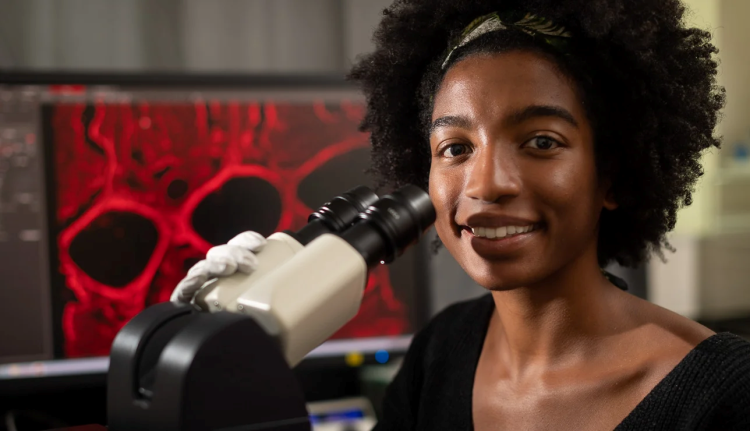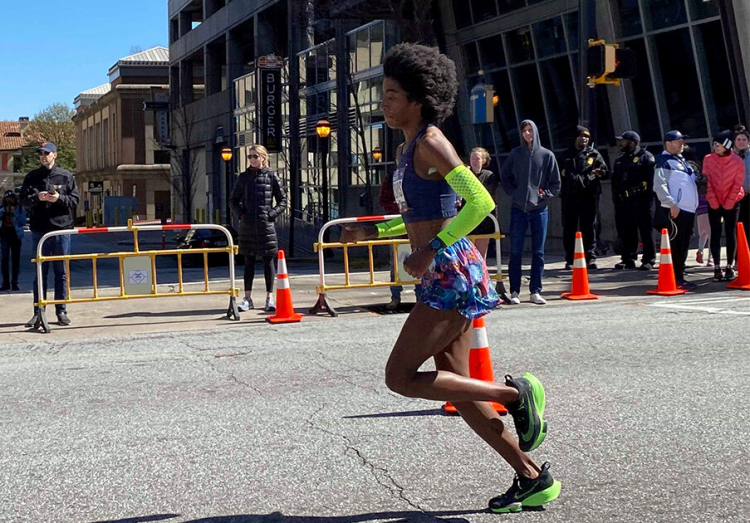Scientist, Olympic hopeful runs with real purpose
CU Boulder postdoctoral researcher, who fuses running with a commitment to environmental causes, to compete in U.S. Olympic women’s marathon trials in February
Peyton Thomas has been interested in biology and environmental science for most of her life. And she’s been running competitively since her high school years in Roswell, Georgia, the Atlanta suburb where she grew up.
As an undergraduate, she studied environmental science and biochemistry and ran track and cross-country at Baylor University.
When she started a PhD program in biology and marine biology at the University of North Carolina Wilmington (UNCW) in 2017, she also began working with private coach Tom Clifford, who introduced her to trail running.

Top image: In addition to marathons, Peyton Thomas is an avid trail runner (photo: Hames Ellerbe); above image: INSTAAR postdoctoral research associate Peyton Thomas is a fish physiologist focused on changing climate regimes and the impacts on fish growth trajectories.
“Tom helped me get into longer-distance running,” says Thomas, a postdoctoral research associate in the Institute of Arctic and Alpine Research (INSTAAR) at the University of Colorado Boulder.
On her 23rd birthday, she ran the legendary Bigfoot 40-mile trail race circumnavigating Washington’s Mount St. Helens, and Clifford helped her train for the 2019 California International Marathon, her first at that distance.
Fast forward to four years later, when Thomas will compete for the first time in the U.S. Olympic marathon trials in Orlando, Florida on Feb. 3, alongside three of her former Baylor teammates. (She was invited to the trials in 2020 but was derailed by an ankle injury.)
“It’s cool to have this amazing field of women helping pull me along, including a lot of old friends,” says Thomas, who hopes to set a PR—personal record.
Her move into trail running and racing at marathon-and-beyond distances coincided with a shift in her academic focus to the impacts of climate change. After seeing the destruction from Hurricane Florence, which hit Wilmington in 2018, she began thinking about how to meld her interest in environmental science with running.
“That changed the way I was thinking about science,” she says. “I wanted to be involved in community and it got me thinking about how running could be a part of that outside of competitive racing.”
She got involved with a project focusing on climate-change policy and local government in and around Wilmington and other social and political issues.
She continued to run trail races, winning the Eastern Divide 50K in 2021.
“After the trials in 2020, I started getting interest from trail-running brands in being sponsored,” she says. In 2021, Patagonia tapped Thomas to be a trail-running ambassador.
[video:https://www.youtube.com/watch?v=9xr1rJ7-H-Q]
Building community
After earning a PhD in biology from UNCW, she took a postdoctoral position at CU Boulder’s INSTAAR. From her new home base, she took the opportunity to enter several Western races, including the Desert Rats 50K on Colorado’s Western Slope, the Bellingham 50K in Washington state and the Broken Arrow in California.
She also ran a race outside Salt Lake City in which runners grind up and barrel down a mountain repeatedly over six hours. The Running Up for Air race series, designed to “amplify informed dialogue and empower organizations actively working on air quality solutions,” vividly showed Thomas how running could make a difference.
“You can see the inversion (pollution trapped by air) so clearly up that high. It’s unfortunate, but it’s a cool way to see the impacts,” she says.

Scientist and marather Peyton Thomas melds her passion for environmental science with running.
Increasingly, Thomas has participated in races and events with social aims, such as the Latino Ultra Nature Adventure at Gross Reservoir in the mountains west of Boulder, which drew participants from across South and Central America. In the autumn of 2023, she partnered with the community of Gloster, Mississippi, to put on the Equitable Action Run Toward Health, which highlighted the air-quality impact and injustice of the wood-pellet industry on a low-income Black community.
“I wanted to create an event that would build community and encourage civic engagement against harmful biomass production,” Thomas wrote in a piece for Patagonia in November 2023.
Meanwhile, at INSTAAR, she is hard at work developing “fish bioenergetic” models as part of an interdisciplinary team modeling projections for the effects of climate change on watersheds in the Yukon region of Alaska and Canada.
“I’m working beyond biologists, so a lot of things are over my head when I’m talking to other people on the team. It’s cool to have the opportunity to learn so much from people and expand my mind,” she says.
Thomas is realistic about her chances to make the U.S. Olympic team but has set a goal of beating her PR of 2:34, set in December at the California International Marathon.
“Given the field of amazing women who run in the mid- to low-2:20s, I’m probably not capable of going” to the Olympics, she says. “But I’m excited to be there, especially since three of my Baylor teammates also qualified.”
Did you enjoy this article? Subscribe to our newsletter. Passionate about Arctic and alpine research? Show your support.

